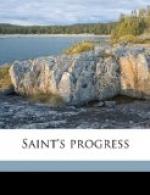The mist cleared into tears, and she could see him again gazing down at her. Was it at her? He was surely seeing something—some vision sweeter than reality, something he loved more dearly. She fell on her knees, and buried her face in her hand. All through the hymn she knelt, and through his clear slow Benediction: “The peace of God, which passeth all understanding, keep your hearts and minds in the knowledge and love of God, and of his Son Jesus Christ our Lord; and the blessing of God Almighty, the Father, the Son, and the Holy Ghost, be amongst you and remain with you always.” And still she knelt on; till she was alone in the Church. Then she rose and stole home. He did not come in; she did not expect him. ‘It’s over,’ she kept thinking; ’all over. My beloved Daddy! Now he has no home; Nollie and I have pulled him down. And yet I couldn’t help it, and perhaps she couldn’t. Poor Nollie!...’
2
Pierson had stayed in the vestry, talking with his choir and wardens; there was no hitch, for his resignation had been accepted, and he had arranged with a friend to carry on till the new Vicar was appointed. When they were gone he went back into the empty Church, and mounted to the organ-loft. A little window up there was open, and he stood leaning against the stone, looking out, resting his whole being. Only now that it was over did he know what stress he had been through. Sparrows were chirping, but sound of traffic had almost ceased, in that quiet Sunday hour of the evening meal. Finished! Incredible that he would never come up here again, never see those roof-lines, that corner of Square Garden, and hear this familiar chirping of the sparrows. He sat down at the organ and began to play. The last time the sound would roll out and echo ’round the emptied House of God. For a long time he played, while the building darkened slowly down there below him. Of all that he would leave, he would miss this most—the right to come and play here in the darkening Church, to release emotional sound in this dim empty space growing ever more beautiful. From chord to chord he let himself go deeper and deeper into the surge and swell of those sound waves, losing all sense of actuality, till the music and the whole dark building were fused in one rapturous solemnity. Away down there the darkness crept over the Church, till the pews, the altar-all was invisible, save the columns; and the walls. He began playing his favourite slow movement from Beethoven’s Seventh Symphony—kept to the end, for the visions it ever brought him. And a cat, which had been stalking the sparrows, crept in through the little window, and crouched, startled, staring at him with her green eyes. He closed the organ, went quickly down, and locked up his Church for the last time. It was warmer outside than in, and lighter, for daylight was not quite gone. He moved away a few yards, and stood looking up. Walls, buttresses, and spire were clothed in milky shadowy grey. The top of the spire seemed to touch a star. ’Goodbye, my Church!’ he thought. ‘Good-bye, good-bye!’ He felt his face quiver; clenched his teeth, and turned away.




